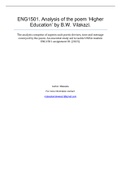Essay
ENG1501. Analysis of the poem Higher Education by B.W. Vilakazi.
- Module
- Institution
This analysis of the poem 'Higher Education' cover aspects such as poetic devices, tone and the message conveyed by the poem. An essential study aid to tackle ENG1501 (2023) Assignment 01.
[Show more]



